
Ethnologia Scandinavica
Scope & Guideline
Exploring the Depths of Scandinavian Culture
Introduction
Aims and Scopes
- Cultural Heritage and Identity:
The journal emphasizes the exploration of cultural heritage, including practices, narratives, and objects that shape identities within Scandinavian contexts. It seeks to understand how heritage is constructed, represented, and transformed in contemporary societies. - Fieldwork Methodologies:
A significant focus is placed on ethnological fieldwork methodologies. This includes participant observation and innovative research techniques that adapt to changing cultural landscapes. - Social Change and Modernity:
The journal addresses issues of social change, including gentrification, migration, and the impact of modernity on traditional practices. It investigates how these changes affect community structures and cultural expressions. - Interdisciplinary Approaches:
Ethnologia Scandinavica encourages interdisciplinary research, integrating perspectives from sociology, anthropology, history, and cultural studies to enrich the understanding of Scandinavian societies. - Decolonial Perspectives:
There is a growing emphasis on decoloniality, examining how colonial legacies influence contemporary cultural institutions and practices, particularly within museum contexts.
Trending and Emerging
- Climate Change and Sustainability:
There is a rising focus on climate change, sustainability, and local activism, indicating an interest in how cultural practices can respond to environmental challenges and promote sustainable living. - Digital Culture and Technology:
Emerging discussions around digital culture, including the impact of social media, digital folklore, and online communities, reflect the journal's adaptation to contemporary modes of interaction and cultural expression. - Migration and Cultural Exchange:
Increasingly, the journal addresses themes of migration, cultural exchange, and the experiences of immigrant communities, highlighting the dynamics of multiculturalism in Scandinavian contexts. - Decolonial and Postcolonial Studies:
There is a growing trend towards examining decolonial perspectives, focusing on the implications of colonial histories and contemporary practices in institutions such as museums and cultural heritage management. - Health and Well-being:
Recent papers explore the intersections of culture, health, and well-being, particularly in light of the COVID-19 pandemic, emphasizing how cultural practices influence health narratives and community resilience.
Declining or Waning
- Traditional Folklore Studies:
There seems to be a decrease in studies focused solely on traditional folklore, as the journal increasingly incorporates contemporary cultural practices and issues, moving away from purely historical analyses. - Rigid Gender Role Analyses:
While gender studies remain relevant, the specific focus on rigid gender roles in historical contexts appears to be waning, with more nuanced discussions of fluid identities and modern gender dynamics taking precedence. - Historical Ethnography:
Papers centered on historical ethnography, particularly those that do not connect to contemporary issues, are less frequently published, indicating a shift towards studies that link past practices with current societal challenges. - Local vs. Global Ethnographies:
There is a noticeable decline in local ethnographic studies that do not engage with global contexts, as the journal increasingly emphasizes interconnectedness and the impact of globalization on local cultures.
Similar Journals
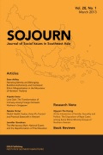
SOJOURN-Journal of Social Issues in Southeast Asia
Fostering Scholarly Dialogue on Regional ChallengesSOJOURN - Journal of Social Issues in Southeast Asia is a distinguished academic publication that has been at the forefront of exploring and analyzing the complex social issues within the Southeast Asian region since its inception. Published by the Institute of Southeast Asian Studies (ISEAS)Anthropology, Sociology, and Political Science. With its ISSN 0217-9520 and E-ISSN 1793-2858, SOJOURN holds a Q3 ranking in both anthropology and sociology categories, reflecting its significant contribution to the literature and its commitment to enhancing understanding of the societal dynamics in Southeast Asia. Although currently not an open-access journal, it provides a vital platform for researchers, professionals, and students dedicated to looking beyond surface issues and diving deep into the cultural and political landscapes of the region. As the journal continues to publish until 2024, it remains an essential resource for knowledge and scholarship, fostering academic dialogue and innovative research in a rapidly evolving socio-political environment.
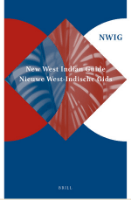
NWIG-New West Indian Guide-Nieuwe West-Indische Gids
Unveiling the Rich Tapestry of Caribbean Society and History.NWIG-New West Indian Guide-Nieuwe West-Indische Gids is a prestigious academic journal published by KITLV PRESS in the Netherlands, dedicated to advancing knowledge in the realms of history, cultural studies, and social sciences. Established in 1977, the journal has consistently provided a platform for scholarly discourse, focusing on the Caribbean and its multifaceted histories, cultures, and societies. With an Open Access model adopted since 2013, it ensures widespread dissemination of critical research that appeals to a diverse academic audience. In 2023, the journal has been recognized with notable quartiles, ranking in Q2 for both cultural studies and history, underscoring its significance in the field. Researchers and students alike can benefit from its vast collection of articles exploring important themes relevant to the Caribbean context and beyond, fostering a deeper understanding of the region's impact on global narratives. For a comprehensive and enriching scholarly experience, NWIG invites submissions that push the boundaries of current knowledge and encourage interdisciplinary engagement.
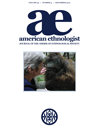
AMERICAN ETHNOLOGIST
Engaging Scholars in Critical Cultural ConversationsAMERICAN ETHNOLOGIST, published by Wiley, stands as a prominent platform in the field of anthropology, with a distinguished reputation underscored by its Q1 ranking in the 2023 Category Quartiles and a notable position in the 79th percentile among its peers. With its foundation dating back to 1974 and set to continue until 2024, this journal serves as a vital resource for researchers, practitioners, and students devoted to exploring cultural dynamics and social practices across diverse communities. The journal is characterized by its commitment to advancing theoretical discussions and empirical scholarship in ethnology and related disciplines. Targeted contributions include in-depth studies, critical reviews, and innovative methodologies that engage with pressing cultural issues. Although it does not offer Open Access, the journal’s rigorous peer-review process and high-impact articles ensure the dissemination of valuable insights, enhancing scholarly engagement and professional discourse. Its ISSN is 0094-0496 and E-ISSN is 1548-1425, emphasizing its dual format accessibility, which facilitates wider readership within the anthropology community.

Studia Ethnologica Croatica
Unlocking the Rich Tapestry of Ethnological ResearchStudia Ethnologica Croatica is a distinguished open-access journal dedicated to the fields of ethnology and cultural anthropology, published by the University of Zagreb's Faculty of Humanities and Social Sciences. Since its inception in 1989, the journal has provided a platform for scholarly discourse and critical analysis of cultural practices, social structures, and ethnographic research pertinent to Croatia and beyond. With an impressive Q2 ranking in Cultural Studies and a strengthening presence in Anthropology (Q3), the journal is essential for researchers and practitioners alike, contributing significantly to ongoing discussions within these disciplines. Recognized on Scopus with notable rankings, it represents a valuable resource for those seeking to deepen their understanding of contemporary ethnological issues. The journal operates under an open access model, ensuring that its high-quality research is freely accessible to a global audience, thereby fostering collaboration and inspiring new inquiries within the social sciences.

Heranca-Revista de Historia Patrimonio e Cultura
Advancing Knowledge in History and PreservationHerança - Revista de História, Patrimonio e Cultura is a distinguished academic journal published by Ponteditora in Portugal, dedicated to the exploration and preservation of history, heritage, and culture. Since its inception in 2018, this open-access journal has established a strong foothold in the academic community, becoming a valuable resource for researchers, professionals, and students alike. With an impressive presence in the Scopus rankings—ranking Q3 in multiple categories such as *Arts and Humanities (Miscellaneous)* and *Cultural Studies*—the journal demonstrates its commitment to advancing interdisciplinary dialogue and fostering innovation in the humanities. By offering unrestricted access to its rich array of scholarly articles, Herança plays a vital role in disseminating knowledge and promoting further research in the fields of history, museology, and the arts. With an aim to bridge theoretical insights and practical applications, this journal stands as an essential contributor to the cultural landscape and heritage studies, making it a pivotal platform for contemporary issues in our understanding of cultural identity and heritage conservation.
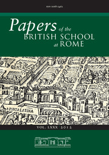
Papers of the British School at Rome
Advancing Interdisciplinary Insights in Art and ArchaeologyPapers of the British School at Rome, published by Cambridge University Press, is a prestigious journal that has been contributing to the fields of archaeology, history, and visual arts since its inception in 1902. With an ISSN of 0068-2462 and an E-ISSN of 2045-239X, this journal serves as an essential platform for innovative research and scholarly dialogue that explores the rich cultural heritage of Rome and its surrounding areas. The journal is ranked in the top quartiles for various categories, including Q1 in Visual Arts and Performing Arts, reflecting its significant impact and relevance in these fields. Despite its non-open access status, the journal boasts a robust readership, comprising researchers, professionals, and students eager to delve into the scholarly discussions it fosters. The Scopus rankings further affirm its reputation, with high percentiles in key areas, marking it as a vital resource for anyone invested in the academic study of classical and contemporary Roman culture. The journal's objective is to promote interdisciplinary research, making it a cornerstone for advancements in art history and archaeological studies.
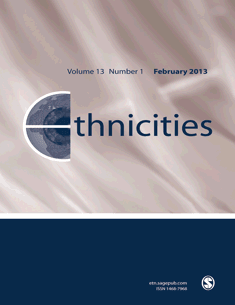
Ethnicities
Fostering Critical Discourse in Ethnic StudiesEthnicities is a leading academic journal published by SAGE Publications Ltd, dedicated to exploring the complex dynamics of ethnicity, cultural identity, and social interactions within diverse communities. Since its inception in 2001, the journal has established a reputable position in the field of Cultural Studies, evidenced by its impressive Q1 ranking in the Cultural Studies category and Q2 ranking in Arts and Humanities (miscellaneous) as of 2023. With a Scopus ranking that places it in the top 8% of journals in Cultural Studies, Ethnicities aims to facilitate critical discourse, innovative research, and scholarly exchange related to ethnicity across global contexts. Researchers, professionals, and students interested in investigating the intricate intersections of race, identity, and social policy will find valuable insights within its pages. For further engagement and access to its comprehensive articles, the journal is available without Open Access options, serving as a vital resource for understanding contemporary issues in ethnicity and cultural relations.

JAPANESE JOURNAL OF RELIGIOUS STUDIES
Exploring the Depths of Faith and CultureThe Japanese Journal of Religious Studies (JJRRS), published by the Nanzan Institute for Religion and Culture, stands as a pivotal platform in the field of Religious Studies, showcasing a rich tapestry of scholarly work since its inception. With an established history of Open Access since 1974, it has fostered a global dialogue among scholars, professionals, and students interested in diverse religious traditions and cultural contexts. The journal's prominence is underscored by its Q1 ranking in the 2023 Scopus category of Religious Studies, reflecting its impact as it ranks #121 out of 644 journals in the field, placing it in the top 19% percentile. Converging years from 2002 to 2023, JJRRS continues to publish rigorously peer-reviewed articles that delve into the complexity of religious phenomena, their intersections with culture, and their implications in contemporary society. Located in Nagoya, Japan, the journal invites contributions that expand the academic understanding of religion in its varied manifestations, making it an essential resource for researchers and students alike seeking to explore this dynamic field.
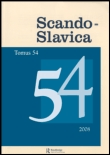
Scando-Slavica
Charting New Territories in Scandinavian and Slavic ResearchScando-Slavica is a renowned academic journal published by ROUTLEDGE JOURNALS, TAYLOR & FRANCIS LTD, specializing in the rich interplay of Scandinavian and Slavic studies. With its ISSN 0080-6765 and E-ISSN 1600-082X, the journal has been a critical resource for scholars since its inception in 1954, covering a wide range of disciplines including archaeology, cultural studies, history, linguistics, and literature. As of 2023, it has consistently ranked in the third quartile across various categories, indicating its influential role in disseminating innovative research within the arts and humanities. With a focus on interdisciplinary dialogue, Scando-Slavica aims to foster a deeper understanding of cultural exchanges and linguistic connections, making it an essential read for researchers, professionals, and students interested in exploring the complexities of Nordic and Slavic interactions. While currently not an open access journal, its contributions have garnered substantial citations, bolstering its academic impact and relevance in a diverse scholarly landscape.

Scandia
Cultivating a Rich Exchange of Historical IdeasScandia is a distinguished academic journal dedicated to the field of history, published by SCANDIA in Sweden. With its origins dating back to 1976, the journal offers a platform for scholarly discourse, focusing on various historical perspectives and methodologies. Although currently not recognized as an Open Access journal, it fosters a rich exchange of ideas and original research, appealing to historians, researchers, and students alike. Operating within the Q4 quartile of its category for 2023, Scandia holds a significant position in the history landscape, ranking at #1627 out of 1760 in Scopus, representing the 7th percentile. With a commitment to quality scholarship, Scandia encourages contributions that challenge existing narratives and contribute to the broader understanding of historical contexts.
Please send your submissions or inquiries to the editorial office at Historiska Inst, Box 2074, Lund 220 02, Sweden.